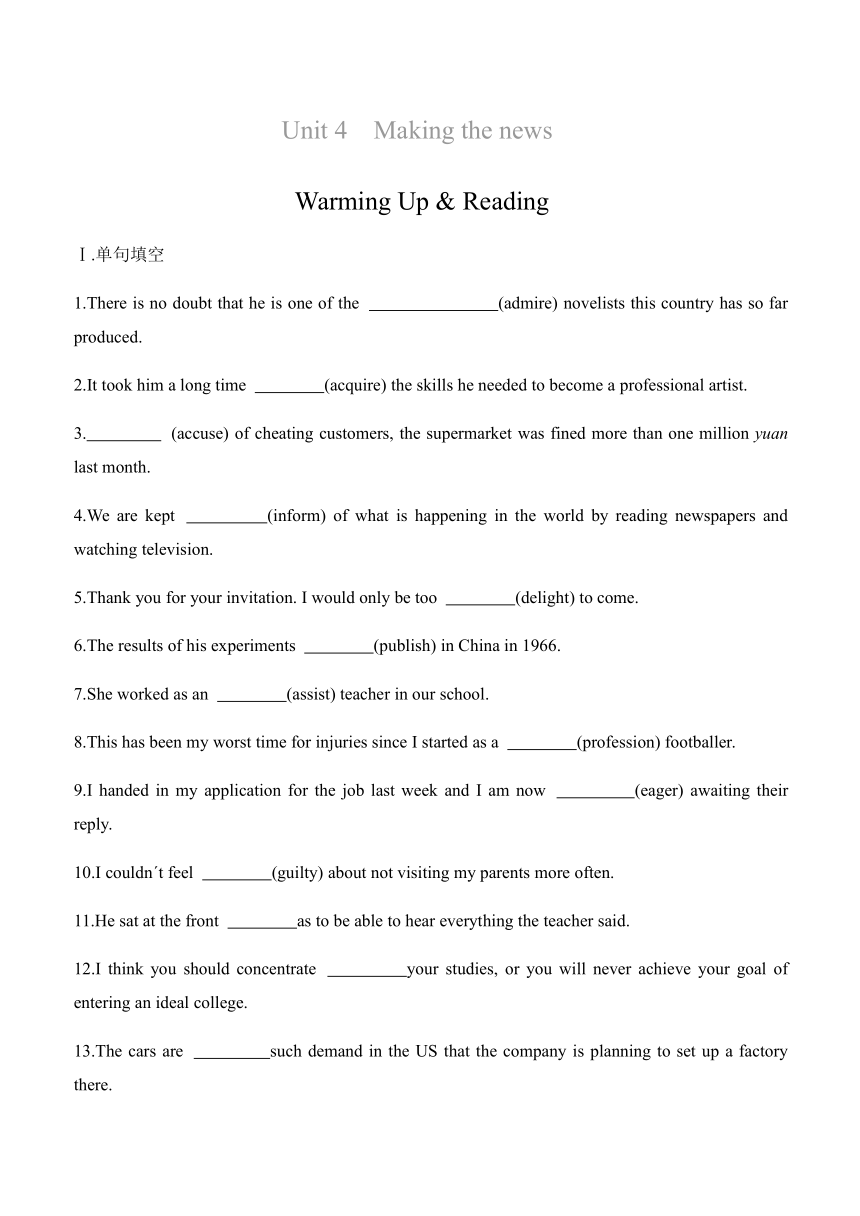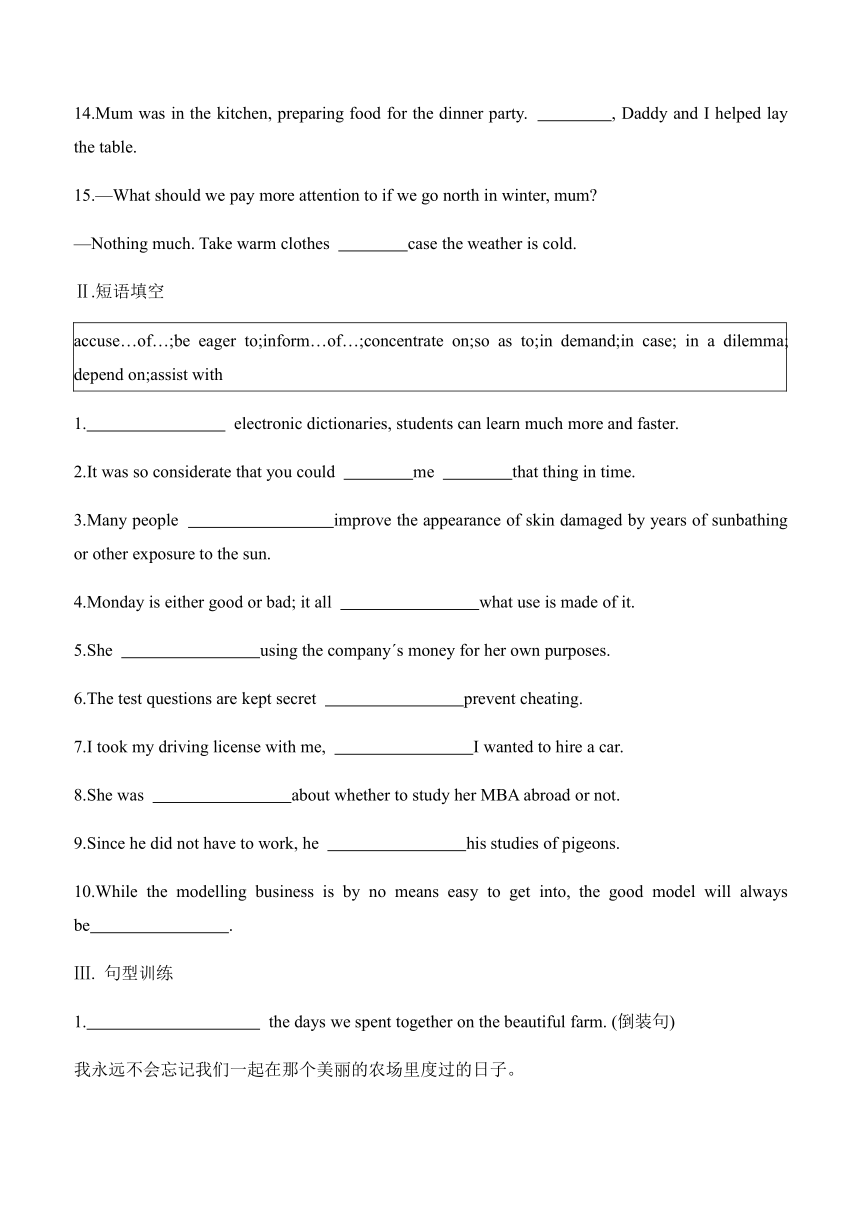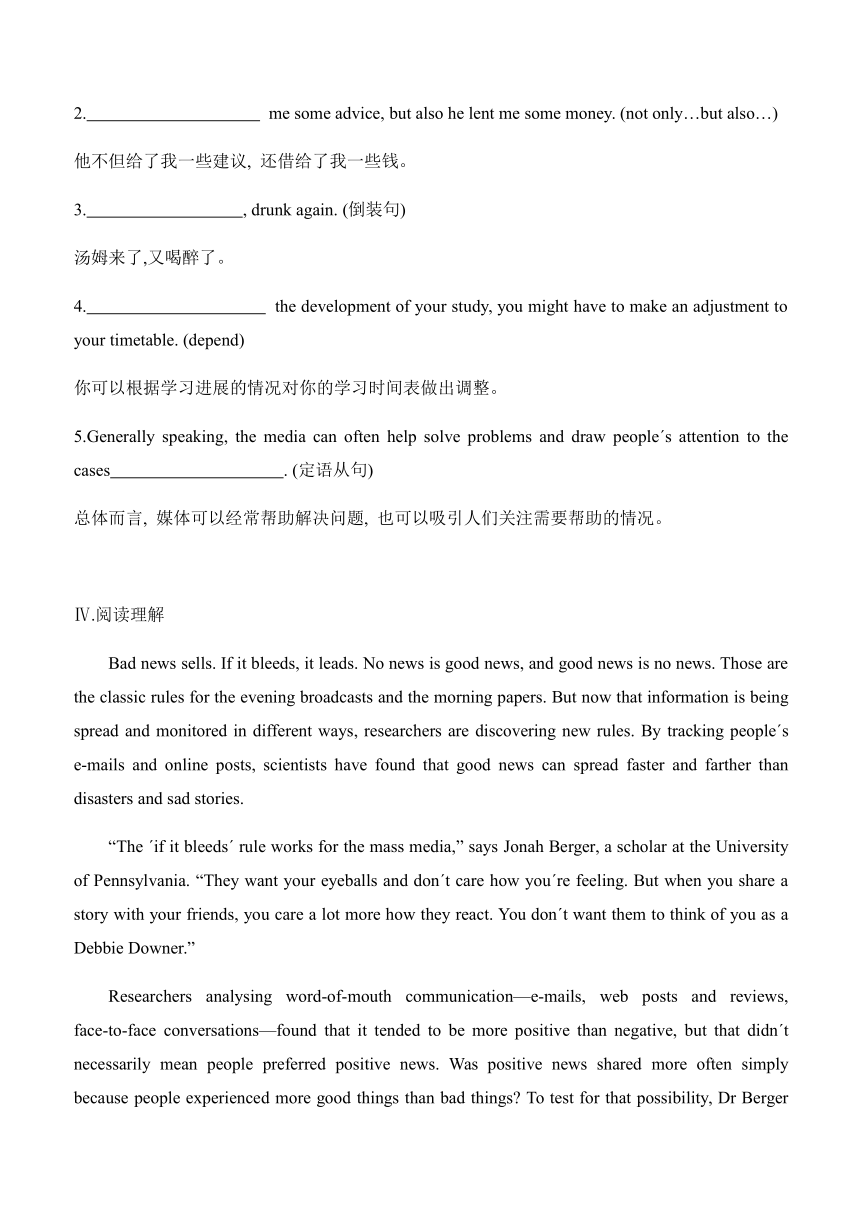人教版新课标高中英语必修五 Unit 4 Making the news Reading 配套练习 含答案详解
文档属性
| 名称 | 人教版新课标高中英语必修五 Unit 4 Making the news Reading 配套练习 含答案详解 |

|
|
| 格式 | zip | ||
| 文件大小 | 37.5KB | ||
| 资源类型 | 教案 | ||
| 版本资源 | 人教版(新课程标准) | ||
| 科目 | 英语 | ||
| 更新时间 | 2019-12-19 08:33:19 | ||
图片预览



文档简介
Unit 4 Making the news
Warming Up & Reading
Ⅰ.单句填空
1.There is no doubt that he is one of the (admire) novelists this country has so far produced. ?
2.It took him a long time (acquire) the skills he needed to become a professional artist. ?
3. (accuse) of cheating customers, the supermarket was fined more than one million yuan last month. ?
4.We are kept (inform) of what is happening in the world by reading newspapers and watching television. ?
5.Thank you for your invitation. I would only be too (delight) to come. ?
6.The results of his experiments (publish) in China in 1966. ?
7.She worked as an (assist) teacher in our school. ?
8.This has been my worst time for injuries since I started as a (profession) footballer. ?
9.I handed in my application for the job last week and I am now (eager) awaiting their reply.?
10.I couldn?t feel (guilty) about not visiting my parents more often. ?
11.He sat at the front as to be able to hear everything the teacher said. ?
12.I think you should concentrate your studies, or you will never achieve your goal of entering an ideal college. ?
13.The cars are such demand in the US that the company is planning to set up a factory there. ?
14.Mum was in the kitchen, preparing food for the dinner party. , Daddy and I helped lay the table. ?
15.—What should we pay more attention to if we go north in winter, mum?
—Nothing much. Take warm clothes case the weather is cold. ?
Ⅱ.短语填空
accuse…of…;be eager to;inform…of…;concentrate on;so as to;in demand;in case; in a dilemma; depend on;assist with
1. electronic dictionaries, students can learn much more and faster. ?
2.It was so considerate that you could me that thing in time. ?
3.Many people improve the appearance of skin damaged by years of sunbathing or other exposure to the sun. ?
4.Monday is either good or bad; it all what use is made of it. ?
5.She using the company?s money for her own purposes. ?
6.The test questions are kept secret prevent cheating. ?
7.I took my driving license with me, I wanted to hire a car. ?
8.She was about whether to study her MBA abroad or not.?
9.Since he did not have to work, he his studies of pigeons. ?
10.While the modelling business is by no means easy to get into, the good model will always be . ?
Ⅲ. 句型训练
1. the days we spent together on the beautiful farm. (倒装句)?
我永远不会忘记我们一起在那个美丽的农场里度过的日子。
2. me some advice, but also he lent me some money. (not only…but also…)?
他不但给了我一些建议, 还借给了我一些钱。
3. , drunk again. (倒装句)?
汤姆来了,又喝醉了。
4. the development of your study, you might have to make an adjustment to your timetable. (depend)?
你可以根据学习进展的情况对你的学习时间表做出调整。
5.Generally speaking, the media can often help solve problems and draw people?s attention to the cases . (定语从句)?
总体而言, 媒体可以经常帮助解决问题, 也可以吸引人们关注需要帮助的情况。
Ⅳ.阅读理解
Bad news sells. If it bleeds, it leads. No news is good news, and good news is no news. Those are the classic rules for the evening broadcasts and the morning papers. But now that information is being spread and monitored in different ways, researchers are discovering new rules. By tracking people?s e-mails and online posts, scientists have found that good news can spread faster and farther than disasters and sad stories.
“The ?if it bleeds? rule works for the mass media,” says Jonah Berger, a scholar at the University of Pennsylvania. “They want your eyeballs and don?t care how you?re feeling. But when you share a story with your friends, you care a lot more how they react. You don?t want them to think of you as a Debbie Downer.”
Researchers analysing word-of-mouth communication—e-mails, web posts and reviews, face-to-face conversations—found that it tended to be more positive than negative, but that didn?t necessarily mean people preferred positive news. Was positive news shared more often simply because people experienced more good things than bad things? To test for that possibility, Dr Berger looked at how people spread a particular set of news stories: thousands of articles on The New York Times? website. He and a Penn colleague analysed the “most e-mailed” list for six months. One of his first findings was that articles in the science section were much more likely to make the list than non-science articles. He found that science amazed the Times? readers and made them want to share this positive feeling with others.
Readers also tended to share articles that were exciting or funny, or that inspired negative feelings like anger or anxiety, but not articles that left them merely sad. They needed to be aroused one way or the other, and they preferred good news to bad. The more positive an article, the more likely it was to be shared, as Dr Berger explains in his new book, Contagious: Why Things Catch On.
1. What do the classic rules mentioned in the text apply to?
A.News reports.
B.Research papers.
C.Private e-mails.
D.Daily conversations.
2. What can we infer about people like Debbie Downer?
A.They?re socially inactive.
B.They?re good at telling stories.
C.They?re inconsiderate of others.
D.They?re careful with their words.
3. Which tended to be the most e-mailed according to Dr Berger?s research?
A.Sports news.
B.Science articles.
C.Personal accounts.
D.Financial reviews.
4. What can be a suitable title for the text?
A.Sad stories travel far and wide
B.Online news attracts more people
C.Reading habits change with our times
D.Good news beats bad on social networks
Ⅴ.语法填空
阅读下面材料,在空白处填入适当的内容(1个单词)或括号内单词的正确形式。
Here are the headlines from BBC World News. The United Nations Conference on the Human Environment opened this morning in New York. The 1. (protect) and improvement of the human environment is a major issue which affects all the people and economic development throughout the world.?
2. American airliner was hijacked (劫持) on a flight from Los Angeles to New York. The hijack 3. (take) place at eleven this morning. The hijacker, 4. identity is not known, demanded to see the American President. The plane is at present at John F.Kennedy International Airport in New York, where 5. has been surrounded by the police.?
The largest quantity of illegal drugs ever was found 6. a London flat yesterday. A police spokesman said that the drugs 7. (hide) in suitcases.He said the value of the drugs was well over five million pounds and the case needed 8. (far) investigation.?
A major accident in southern Sweden happened today. It?s reported that this afternoon a ship crashed into a bridge. 9. (lucky), seven cars and six trucks are said 10. (fall) into the water from the bridge. We hope to have more details in our next news broadcast. Those are the latest headlines.
参考答案answer
Ⅰ.1.most admirable 2.to acquire 3. Accused 4.informed 5.delighted
6.were published 7.assistant 8. professional 9.eagerly
10. guiltier 11. so 12. on 13.in 14. Meanwhile 15. in
Ⅱ.1.Assisted with 2.inform; of 3.are eager to 4.depends on
5.was accused of 6.so as to 7.in case 8.in a dilemma
9.concentrated on 10.in demand
Ⅲ.1.Never shall I forget 2. Not only did he give 3.Here comes Tom
4.Depending on 5.where/in which help is needed
Ⅳ.【文章大意】 人们常说“没有消息就是最好的消息”。类似的传统说法只适合于大众媒体,在网络普及的时代,好消息在网络上的传播速度比坏消息要快很多。
1.A 细节理解题。 根据第二段中的“?The “if it bleeds” rule works for the mass media,?…”可知,像“if it bleeds”这样的传统说法适用于大众媒体,故选A。
2.C 推理判断题。根据“…you care a lot more how they react…”可知,你非常在乎朋友听完你讲的故事后的反应;再根据“You don?t want them to think of you as a Debbie Downer.”可知,你不想被当作一个Debbie Downer,说明此处指的是“一个不为他人考虑的人”。故选C。
3.B 细节理解题。根据第三段“…articles in the science section were much more likely to make the list than non-science articles.”可知,科技类的文章比非科技类的文章更有可能被人们关注,故选B。
4.D 主旨大意题。根据第一段“By tracking people?s e-mails and online posts, scientists have found that good news can spread faster and farther than disasters and sad stories.”可知,在网络上好消息比坏消息传播得更快,影响更深远,故选D。
Ⅴ.【文章大意】 本文主要介绍了四则BBC世界新闻,分别为一次会议的召开,一起劫机事件,一起非法私藏毒品案件和一起船撞桥事故。
1.protection 考查词形转换。“The…(protect) and improvement of the human environment…”作句子的主语,故用其名词形式protection。
2.An 考查冠词。airliner“大型客机,班机”,是个可数名词。
3.took 考查动词时态。根据后文具体的时间状语at eleven this morning可知用一般过去时。
4.whose 考查定语从句。劫机犯的身份不明,从句里缺定语,故用whose。
5.it 考查代词。此处where引导的定语从句里缺主语,it指出事飞机。
6.in 考查介词。非法毒品在伦敦一处公寓里被发现了。
7.were hidden 考查被动语态。毒品被藏在手提箱里。
8.further 考查形容词比较级。案件需要做进一步调查。far指抽象概念“进一步”时,比较级为further。
9.Unluckily 考查词形转换。根据语意判断,上下文为转折关系。故填Unluckily。
10.to have fallen 考查非谓语动词。据说有七辆轿车和六辆卡车从桥上掉入了河里。be said to have done据说发生过某事。
